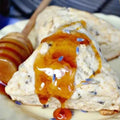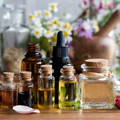
7 Essential Oils for Honeybee Health and Pest Management
Learn how to use these 7 essential oils in beekeeping. These natural extracts are revolutionizing hive management, pest control, and bee health.
FUN FACT: Smearing a finger's worth of menthol vapor rub on your landing board in September will greatly deter yellow jacket invasion and destruction.
Subscribe
To join our mailing list and never miss an update!
In the realm of beekeeping, essential oils have emerged as valuable tools for hive management and bee health. From attracting swarms to deterring pests, these aromatic extracts offer beekeepers a natural and effective means of supporting their colonies.
In this article, we delve into the use of essential oils in beekeeping, exploring their diverse applications and the ways in which they contribute to the well-being of these vital pollinators.
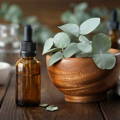
Essential oils can be used in beekeeping for various purposes, including pest management, hive maintenance, and overall bee health. However, it's essential to use them judiciously and with proper care, as excessive use or improper application can harm the bees. Here are some essential oils commonly used in beekeeping:
1. Lemongrass Oil:
• Attracting Swarms: Lemongrass oil is known for its ability to mimic the pheromones of a queen bee. Beekeepers often use it in bait hives or swarm traps to lure wild swarms or capture swarms from their own colonies.
• Proper Usage: A few drops of lemongrass oil on a cotton ball or absorbent material can be placed inside a bait hive or swarm trap to attract bees. Replace the material periodically to maintain the scent's effectiveness.
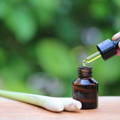
2. Peppermint Oil:
• Pest Management: Peppermint oil has a strong and pleasant scent that can help mask the pheromones released by pests like varroa mites. This can disrupt their ability to locate bee brood cells.
• Caution: While peppermint oil can be beneficial, using too much of it can stress the bees due to its overpowering scent. Use it sparingly and only when needed.
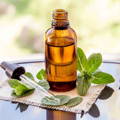
3. Thyme Oil:
• Disease Control: Thyme oil is prized for its antimicrobial properties and is sometimes used to combat diseases such as American Foulbrood (AFB) in beehives.
• Application: Thyme oil can be diluted in a carrier oil or sugar syrup and applied to hive components or sprayed in the hive to help control diseases.
4. Tea Tree Oil:
• Antimicrobial Properties: Tea tree oil is another option with antimicrobial properties. It can be used similarly to thyme oil to help maintain hive health and combat diseases.
• Dilution: Always dilute tea tree oil properly to avoid harming the bees or damaging hive components.
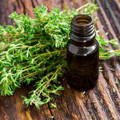
5. Eucalyptus Oil:
• Pest Repellent: Eucalyptus oil may help deter small hive beetles, which can be a nuisance to bee colonies. It's often used by placing eucalyptus leaves in the hive or by using a diluted eucalyptus oil solution.
• Moderation: As with other strong-scented oils, use eucalyptus oil in moderation to avoid overwhelming the bees.
Trending Articles
6. Wintergreen Oil:
• Mite Control: Wintergreen oil can be mixed with powdered sugar and dusted onto the bees. This can help dislodge tracheal mites and promote their removal from the hive.
• Careful Application: Be cautious with the application of wintergreen oil to avoid overexposing the bees to it.
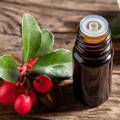
7. Spearmint Oil:
• Varroa Mite Management: Spearmint oil, like peppermint oil, can help deter varroa mites. Use it sparingly, and remember that the strong scent can be disruptive to the bees.
• Monitoring: Continuously monitor the hive for mite levels and adjust your essential oil treatments accordingly.
Incorporating essential oils into your beekeeping practices should be done with care, taking into consideration the specific needs and conditions of your bee colony.
Always consult local experts and follow best practices for beekeeping in your region. Essential oils are a valuable tool in beekeeping, but they should complement a broader strategy of hive management and bee health maintenance.
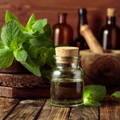
When using essential oils in beekeeping, it's important to:
• Dilute Properly: Always dilute essential oils in a carrier oil or sugar syrup to avoid overwhelming the bees with strong scents.
• Use Sparingly: Bees have a highly sensitive sense of smell, so use essential oils sparingly to prevent disruption to the hive.
• Monitor Effectiveness: Keep a close eye on the health of your bee colony and monitor for the presence of pests and diseases. Essential oils should be part of an integrated pest management (IPM) strategy, not the sole solution.

• Follow Safety Guidelines: Ensure you are using food-grade, pure essential oils that are safe for bees and humans. Some essential oils can be toxic to bees if used incorrectly.
• Consult Local Beekeeping Experts: Local beekeeping associations and experts can provide guidance on the specific challenges and solutions for your region.
Remember that while essential oils can be beneficial in beekeeping, they are not a replacement for proper hive management practices and regular inspections. Beekeepers should always prioritize the well-being of their bees through comprehensive care and monitoring.
Trending Products
Copyright©2023 All rights reserved. We love to have you share our article as long as you include a direct link to this page. This article or any portion thereof , including all images, may not be reproduced or used in any manner whatsoever without the express written permission of Gypsy Shoals Farm.

